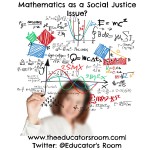 I attended several sessions on Teaching Mathematics for Social Justice at this year’s NCTM Annual Conference. I noticed similar faces in all of the sessions I selected. This meant that hundreds of other faces had completely excluded this topic as one of value to their pedagogical growth. I started wondering how this important work would trickle down if its pool of proponents was stagnant. So, I began asking some questions. As I met random people and we struck up conversations I covertly posed one of three questions: 1) Have you attended any Social Justice Sessions? 2) Do you teach mathematics with a Social Justice agenda? 3) What is teaching mathematics for Social Justice all about? Question number two generally came about when it was discovered that my audience had indeed attended or selected to attend a social justice themed session. One of the more interesting thoughts that came from my mini conversations was that most of these educators had no idea they were engaged in social justice experiences without consciously choosing them. While responses varied, most of them seemed to live somewhere on the “not really interested” side of the continuum. “But this is important work!” I thought to myself… “This is relevant work!”
I attended several sessions on Teaching Mathematics for Social Justice at this year’s NCTM Annual Conference. I noticed similar faces in all of the sessions I selected. This meant that hundreds of other faces had completely excluded this topic as one of value to their pedagogical growth. I started wondering how this important work would trickle down if its pool of proponents was stagnant. So, I began asking some questions. As I met random people and we struck up conversations I covertly posed one of three questions: 1) Have you attended any Social Justice Sessions? 2) Do you teach mathematics with a Social Justice agenda? 3) What is teaching mathematics for Social Justice all about? Question number two generally came about when it was discovered that my audience had indeed attended or selected to attend a social justice themed session. One of the more interesting thoughts that came from my mini conversations was that most of these educators had no idea they were engaged in social justice experiences without consciously choosing them. While responses varied, most of them seemed to live somewhere on the “not really interested” side of the continuum. “But this is important work!” I thought to myself… “This is relevant work!”
Interrogating societal issues is not a new idea. Scholars have been questioning the hidden curriculum and impact of privilege on the marginalized for years. My former dissertation Chair, Dr. David Stinson, always places the beginnings of social justice work with the Frankfurt School, Karl Marx, and Critical theorists. More specifically in mathematics, scholars such as Rochelle Gutierrez (2008), Eric Gutstien (2006), Danny Martin (2003) & Ole Skovsmose (1994), have been central contributors to this work. So the foundation for social justice mathematics teaching is rooted in taking a critical perspective of education. A need for a critical perspective is easily argued in other disciplines such as the social sciences, and it should be just as worthy of consideration in mathematics because the discipline carries with it high levels of privilege and power.
What better spaces to be critical, I thought, than in educational spaces where learners ask questions, explore ideas, and ultimately create their own truths. When teachers take a look at community issues and consider school reform initiatives or trouble levels of rigor across math classes, they are inviting a critical lens into the profession. Teaching in this way simply means allowing our students to have their own critical lens. As educators we can engage students in rigorous and important mathematical concepts, while drawing attention to social justice issues that can be interrogated through the use of mathematical ideas. As students they can critique their environment and the world at large and gain access to powerful mathematics in the process. So as mathematics educators we are already embedded in this work because we teach children, who live in communities, which are impacted by economic thresholds, and global conditions. We can’t get away from this. Thus, focusing our vision brings intent to the experiences we let flourish within the four walls of our classrooms.
Gutiérrez, R. (2008). A” gap-gazing” fetish in mathematics education? Problematizing research on the achievement gap. Journal for Research in Mathematics Education, 357-364.
Gutstein, E. (2006). Reading and writing the world with mathematics: Toward a pedagogy for social justice. New York: Routledge.
Martin, D. B. (2003). Hidden assumptions and unaddressed questions in mathematics for all rhetoric. The Mathematics Educator, 13(2), 7–21.
Skovsmose, O. (1994). Towards a philosophy of critical mathematics education. Dordrecht, the Netherlands: Kluwer.




